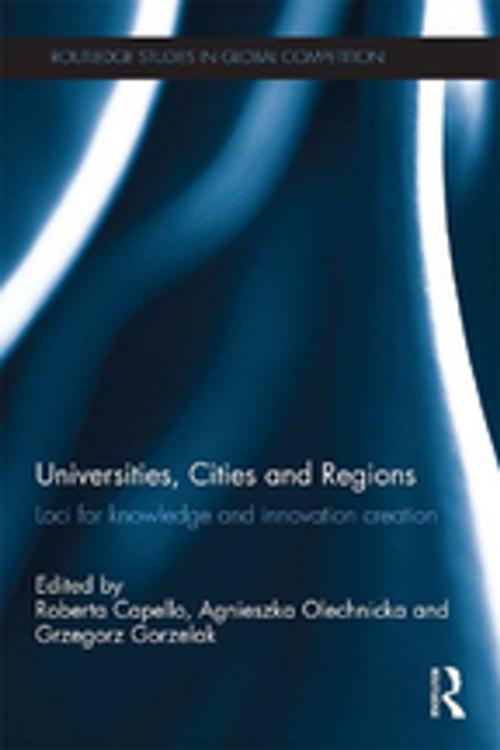Universities, Cities and Regions
Loci for Knowledge and Innovation Creation
Business & Finance, Economics, Development & Growth| Author: | ISBN: | 9781136221316 | |
| Publisher: | Taylor and Francis | Publication: | December 7, 2012 |
| Imprint: | Routledge | Language: | English |
| Author: | |
| ISBN: | 9781136221316 |
| Publisher: | Taylor and Francis |
| Publication: | December 7, 2012 |
| Imprint: | Routledge |
| Language: | English |
Regions and cities are the natural loci where knowledge is created, and where it can be easily turned into a commercial product. Regions are territories where, under certain socio-economic conditions, a strong sense of belonging and mutual trust develops the ability to transform information and inventions into innovation and productivity increases, through cooperative or market interaction. Especially in contexts characterised by a plurality of agents — such as cities or industrial districts — knowledge is the result of cooperative learning processes, nourished by spatial proximity, network relations, interaction, creativity and recombination capability.
This book explains the logic behind these interactions and cooperative attitudes in regions and cities. One of the most significant channels comes from the presence of a university and its collaboration with firms and scientific research centres. These mutual relations between academic institutions and enterprises are of key importance.
The significance of universities in driving economic well being and regional development has been well documented for some time now. Much of the research, however, has centred upon countries in Western Europe and the United States. Increasingly, and since the expansion of the European Union in 2004 in particular, themes of academic entrepreneurship, university-business links, knowledge and innovation have become important on a Europe-wide scale. This book draws together key thinkers from across the continent to analyze the importance of higher educational institutions in fostering development.
Regions and cities are the natural loci where knowledge is created, and where it can be easily turned into a commercial product. Regions are territories where, under certain socio-economic conditions, a strong sense of belonging and mutual trust develops the ability to transform information and inventions into innovation and productivity increases, through cooperative or market interaction. Especially in contexts characterised by a plurality of agents — such as cities or industrial districts — knowledge is the result of cooperative learning processes, nourished by spatial proximity, network relations, interaction, creativity and recombination capability.
This book explains the logic behind these interactions and cooperative attitudes in regions and cities. One of the most significant channels comes from the presence of a university and its collaboration with firms and scientific research centres. These mutual relations between academic institutions and enterprises are of key importance.
The significance of universities in driving economic well being and regional development has been well documented for some time now. Much of the research, however, has centred upon countries in Western Europe and the United States. Increasingly, and since the expansion of the European Union in 2004 in particular, themes of academic entrepreneurship, university-business links, knowledge and innovation have become important on a Europe-wide scale. This book draws together key thinkers from across the continent to analyze the importance of higher educational institutions in fostering development.















